5 former Red Sox eligible for the Hall of Fame ballot in 2023

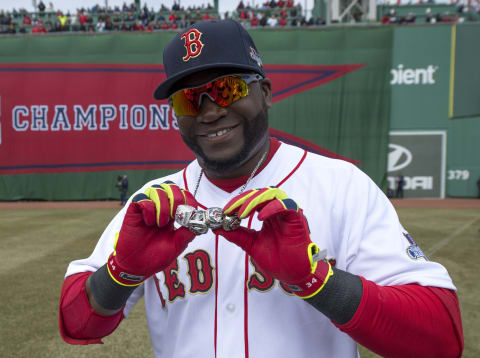
These former Boston Red Sox are Hall of Fame eligible in 2023
The Baseball Hall of Fame ballot will be drastically different next year in the aftermath of the Class of 2022, with several former Boston Red Sox players being added and removed.
David Ortiz clearly won’t be on the ballot since he was elected into the Hall of Fame by receiving 77.9% of the vote this year.
Former Red Sox pitchers Roger Clemens and Curt Schilling fell short of the percentage of votes required for induction in their 10th and final year on the ballot. Neither will be getting an invitation to Cooperstown and they are no longer eligible. In Schilling’s case, that’s what he wanted all along, right?
Jonathan Papelbon, A.J. Pierzynski, Carl Crawford and Jake Peavy received less than five percent of the vote, which means these former Red Sox players will drop off the ballot next year.
That eliminates most of the candidates with ties to the Red Sox. Manny Ramirez is the most notable holdover but his chances of being elected already appear doomed. Billy Wagner, who had a very brief stay in Boston near the end of his career, reached 51% in his eighth year of eligibility.
While there aren’t many former Red Sox returning to the ballot next year, there are a handful who will be eligible for the first time in 2023. This doesn’t include infielder Aaron Hill, who spent an underwhelming 47 games with the Red Sox near the end of his career.
Baseball-Reference has a Hall of Fame monitor created by Bill James that attempts to measure the chances that a player will be elected. A score over 100 is likely while anything under 100 is less likely. This metric ignores any association with PEDs or off-field behavior, which is why Clemens and Schilling have high scores despite falling short of election. Ortiz had a score of 171.
We’ll be ranking the five new additions with ties to the Red Sox in order of their HOFm score.
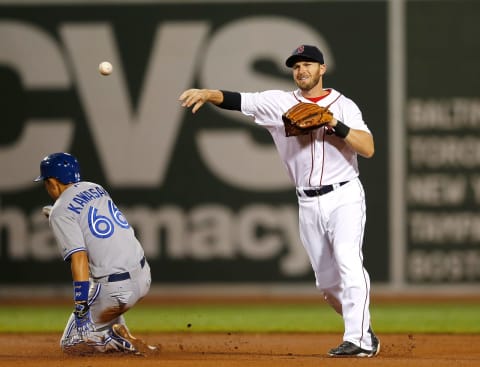
Red Sox infielder Stephen Drew
Years with Red Sox: 2013-2014 (163 games)
HOFm score: 11
The younger brother of former Red Sox outfielder J.D. Drew, Stephen Drew signed with the Red Sox in 2013 to serve as a temporary placeholder at shortstop. The position had been a revolving door in Boston since Nomar Garciaparra was traded in 2004. Drew was among the last to fill that role until the emergence of Xander Bogaerts, who debuted in August of 2013 and slowly started siphoning playing time away from Drew.
In 124 games that season, Drew hit .253 with a .777 OPS, 13 home runs and 67 RBI. He appeared in 16 postseason games on the way to winning a World Series but he was a meager 6-for-54 (.111) at the plate.
Drew turned down a one-year, $14 million qualifying offer from the Red Sox after the 2013 season but never found the multi-year deal he was looking for. He held out until after the June draft when a team could sign him without forfeiting a pick but ended up settling for a return to Boston on a pro-rated deal that was estimated at around $10 million.
The delayed start to his season led to Drew sputtering out of the gate, hitting .176 in 39 games. The Red Sox traded him to the Yankees at the deadline in a rare deal between the division rivals.
Drew hit .252/.318/.423 over his 12 seasons with Arizona, Oakland, Boston, New York and Washington. He was a solid role player but never a star and certainly not a Hall of Famer.
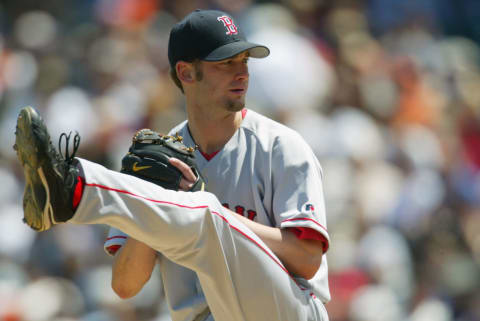
Red Sox pitcher Bronson Arroyo
Years with Red Sox: 2003-2005 (73 games)
HOFm score: 15
The Red Sox claimed Bronson Arroyo off waivers from the Pittsburgh Pirates in 2003 and he made six appearances out of the bullpen near the end of that season. He moved into the rotation the following year, posting a 4.03 ERA in 32 appearances (29 starts).
Arroyo was a part of the curse-breaking club that snapped an 86-year title drought in 2004. One of the most infamous moments of that postseason involved Arroyo, when Yankees star Alex Rodriguez slapped the ball out of his glove while racing to first base. A-Rod was ultimately ruled out on the play and was skewered by fans and the media for his embarrassing actions.
Arroyo had another solid season in 2005, going 14-10 with a 4.51 ERA while logging over 200 innings.
Boston traded Arroyo to the Cincinnati Reds for Wily Mo Pena after the 2005 season. It turned out to be a regrettable deal since Pena never lived up to the potential of his enticing power while Arroyo broke out with a career year with the Reds, posting a 3.39 ERA while leading the league in innings pitched and earning an All-Star appearance.
Arroyo finished his 16-year career with a 148-137 record and 4.28 ERA. He was never an ace but an innings-eater who topped 200 innings eight times while producing a winning record has value to any team.
He’s not going to be in the Hall of Fame but the Red Sox still shouldn’t have traded him.
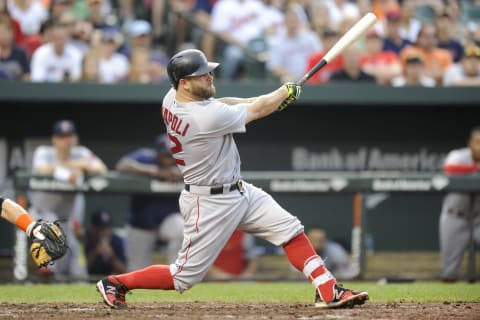
Red Sox first baseman Mike Napoli
Years with Red Sox: 2013-2015 (356 games)
HOFm score: 17
The Red Sox were in desperate need of a makeover in the wake of a last-place finish that saw the clubhouse mutiny against manager Bobby Valentine. A blockbuster trade in August of 2012 shed a significant amount of payroll, allowing the front office to retool the roster around high-character veterans who could restore the team’s chemistry. Mike Napoli was one of those veterans.
Napoli was coming off an All-Star season with the Texas Rangers when he signed with the Red sox for the 2013 season. He mashed 23 homers and drove in a career-high 92 RBI that year.
The roster reshuffling worked to perfection as the Red Sox went from worst to first to capture a World Series title. Napoli played a key role in that championship run, hitting .300 with a pair of homers in the ALCS against the Detroit Tigers. That included a solo shot in a 1-0 Game 3 victory.
Napoli hit .242 with a .785 OPs over parts of three seasons with the Red Sox. He was traded back to Texas at the 2015 deadline and finished the year strong for the Rangers.
In 12 seasons, Napoli hit .246/.346/.475 with 267 home runs.
He’s not going to get much consideration for the Hall of Fame but Napoli established himself as a fan-favorite in Boston who helped change the culture of the clubhouse and he was a valuable member of a World Series championship team.
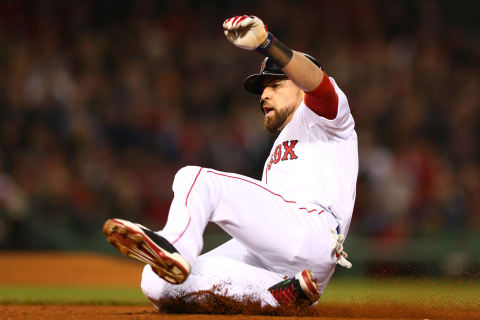
Red Sox outfielder Jacoby Ellsbury
Years with Red Sox: 2007-2013 (715 games)
HOFm score: 36
Jacoby Ellsbury made an immediate impact when he was called up to join the Red Sox in 2007. He hit .353 in 33 games and emerged as the team’s primary center fielder during their postseason run that resulted in a World Series title. Ellsbury hit a scorching .438 in the Fall Classic against the Colorado Rockies.
In his first full season in the big leagues, Ellbury used his blazing speed to lead the league with 50 stolen bases. The following year, he set the single-season franchise record with 70 steals while also leading the league with 10 triples. Ellsbury’s 241 steals in a Red Sox uniform rank third in franchise history despite that he only spent seven seasons in Boston.
2011 was a career year for Ellsbury. He hit .321 with a .928 OPS, 32 home runs, 105 RBI and 39 steals. He was named an All-Star, won a Gold Glove and Silver Slugger award, while finishing as the runner-up in the AL MVP race.
That year would prove to be an outlier, at least in the power department. Ellsbury never hit more than 16 homers in any other season and his total was in the single-digits in nine of his 11 seasons.
Once a fan-favorite in Boston, Red Sox Nation turned on Ellsbury when he bolted to sign a lucrative free-agent deal with the Yankees. While fans were initially stung about his betrayal, the bitterness faded when injuries and a rapid decline in production turned Ellsbury’s deal with the Yankees into an albatross. The Red Sox dodged a bullet by refusing to outbid their rivals.
A young Ellsbury might have had a case for being on a Hall of Fame trajectory with his elite speed and emerging power. Injuries sapped some of his speed when he reached his early-30s and he wasn’t able to sustain the power he flashed during his All-Star campaign. An inability to stay healthy and a peak that wasn’t long enough takes Ellsbury out of serious consideration for Cooperstown.
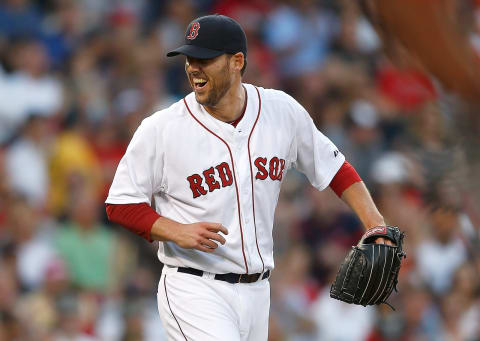
Red Sox pitcher John Lackey
Years with Red Sox: 2010-2014 (111 games)
HOFm score: 48
John Lackey began his career with the Angels in 2002 and won his first World Series ring that year. He emerged as their ace over his eight seasons in Los Angeles. Lackey was an All-Star in 2007 when he finished third on the Cy Young ballot.
His productive career with the Angels led to Lackey signing a lucrative free-agent deal with the Red Sox in 2010 which immediately turned out to be a bust. He was a workhorse during his first season in Boston, tossing 215 innings over 33 starts, but posted an underwhelming 4.40 ERA. The following season would be the worst of his career, with Lackey producing a 6.41 ERA while leading the league in earned runs allowed and hit batters.
Tommy John surgery wiped out his entire 2012 season but Lackey came back strong the following year when he posted a 3.52 ERA and career-best 4.03 strikeout-to-walk ratio. Finally, the Red Sox were getting the pitcher they were paying for.
Unfortunately, it wouldn’t last much longer. Lackey had a unique clause in his contract that would allow the Red Sox to retain him on a club option for the major league minimum if he missed time due to a pre-existing injury – which he did when he underwent Tommy John surgery. Lackey wasn’t interested in pitching in Boston for such a low salary and there were whispers that he was threatening to retire rather than honor the agreement he made when he signed the contract.
Rather than deal with that messy situation, the Red Sox traded Lackey to the St. Louis Cardinals midway through the 2015 season. He had an excellent year in 2016 when the Cardinals were able to keep him for a bargain price. Apparently he was willing to pitch for the minimum, just not in Boston.
He finished his career with the Chicago Cubs and was a part of the club that ended a championship drought that had lasted for over a century.
Lackey owned a 188-147 record, 3.92 ERA and 7.3 K/9 over 15 seasons. He only made one All-Star appearance and it came in the only season in which he was a serious Cy Young candidate. Lackey gets boost for his postseason performance, winning a World Series ring with three different franchises while going 8-6 with a 3.44 ERA in 29 career playoff games.
That’s not enough to put Lackey in the Hall of Fame conversation though. His 48 HOFm score is lower than anyone on the 2022 ballot. Peavy (56) and Crawford (53) had higher scores but didn’t receive any votes. That doesn’t necessarily tell us much considering Mark Buehrle (52) had the lowest score but still eclipsed the five percent threshold to remain on the ballot for next year. This metric clearly doesn’t factor in everything that voters consider but it gives us an idea of how players might fare on the next ballot. Buehrle had a much more accomplished career than Lackey so if he barely made the cut, it’s hard to see the former Red Sox pitcher getting much attention.
Lackey might get a few stray votes thrown his way but probably not enough to remain on the ballot in 2024 and certainly not enough to get inducted into the Hall of Fame.
With several prominent names leaving the ballot this year, it frees up room for the BBWAA to consider other options since they are limited to voting for only 10 candidates. That could result in more borderline candidates getting some additional support. It will be interesting to see if any of these former Red Sox players get any votes but it’s fair to assume none of them will be joining Ortiz as a first-ballot Hall of Famer.
Next. 10 greatest hitters in Red Sox history. dark